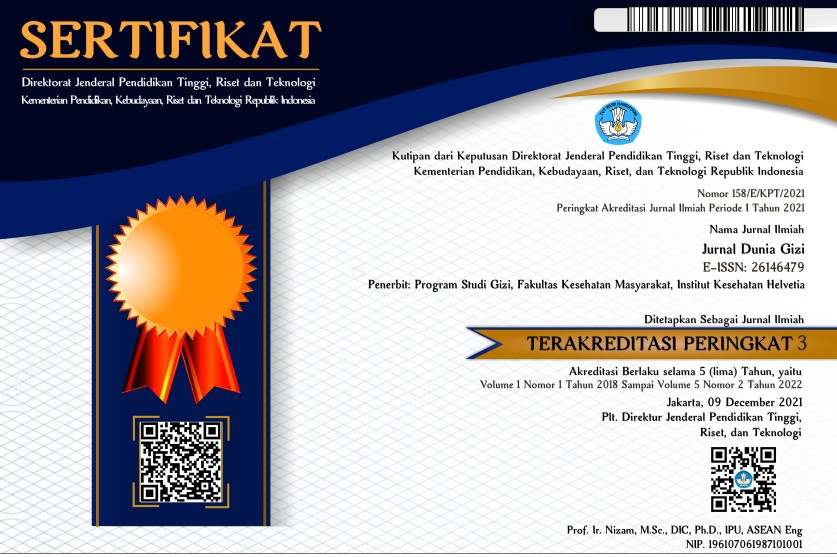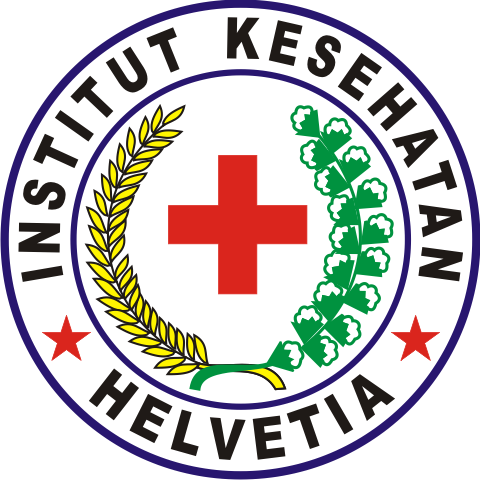Pengaruh Diabetes Self Management Education Terhadap Indeks Massa Tubuh Penderita Diabetes Melitus Tipe 2
Abstract
Pendahuluan: Penyakit kronis yang jumlahnya selalu meningkat setiap tahunnya di dunia salah satunya Diabetes Mellitus. Kriteria yang penting dalam menjaga kesehatan penderita diabetes mellitus khususnya dalam menjaga kadar glukosa darah tetap ideal dilihat dari indeks massa tubuh. Tujuan: Untuk mengetahui pengaruh diabetes self management education terhadap indeks massa tubuh penderita diabetes di kota Padangsidimpuan. Metode: Penelitian ini Quasi Eksperimen dengan desain one group pretest-posttest only design dengan melibatkan 40 responden berdasarkan perhitungan besar sampel dengan menggunakan rumus sample size determination in health studies. Teknik sampel yang digunakan adalah proportionale random sampling. Kriteria berupa penderita DM tipe 2, pasien diabetes yang tidak mengalami gangguan kognitif, dapat berkomunikasi verbal maupun nonverbal. Penelitian ini dilakukan selama 3 bulan dengan intervensi sebanyak 6 kali dengan priode waktu 2 jam setiap sesi pemberian edukasi. Pengukuran IMT menggunakan timbangan dan microtoise. Analisis data yang diguanakan yaitu uji Chi-Square dan Paired T-Test. Hasil: Penelitian ini ditemukan bahwa rerata sebelum intervensi DSME didapatkan nilai IMT sebesar 25.266 kg/m2 (SD=2.053) dan rerata sesudah intervensi DSME didapatkan nilai IMT sebesar 24.281 kg/m2 (SD=2.142) (p value= <0.001). Kesimpulan: DSME efektif dalam menurunkan IMT pada penderita diabetes mellitus. Penderita DM dapat memanfaatkan DSME sebagai intervensi mandiri yang dapat dilakukan di rumah untuk mengontrol berat badan ideal agar kadar glukosa darah tetap stabil.
Keywords
Full Text:
PDFReferences
International Diabetes Federation. International Diabetes Federation Atlas 10th Editoin. Vol. 102, Diabetes Research and Clinical Practice. 2021. 147–148 p.
IDF. International Diabetes Federation: Diabetes Atlas. 2020.
Sun H, Saeedi P, Karuranga S, Pinkepank M, Ogurtsova K, Duncan BB, et al. IDF Diabetes Atlas: Global, regional and country-level diabetes prevalence estimates for 2021 and projections for 2045. Diabetes Res Clin Pract. 2022;183:109119.
Cho NH, Shaw JE, Karuranga S, Huang Y, da Rocha Fernandes JD, Ohlrogge AW, et al. IDF Diabetes Atlas: Global estimates of diabetes prevalence for 2017 and projections for 2045. Diabetes Res Clin Pract. 2018;138:271–81.
KEMENKES. Hasil Utama Riskesdas Tentang Prevalensi Diabetes Mellitus di Indonesia 2018. Has Utama Riskesdas Tentang Prevalensi Diabetes Melitus di Indones 2018. 2018;8.
Riskesdas. Penelitian dan Pengembangan Kesehatan Kementerian Kesehatan RI. J Chem Inf Model. 2018;53(9):1689–99.
Tang ML, Zhou YQ, Song AQ, Wang JL, Wan YP, Xu RY. The Relationship between Body Mass Index and Incident Diabetes Mellitus in Chinese Aged Population: A Cohort Study. J Diabetes Res. 2021;2021:0–7.
Kosupa DZ, Utama F. Relationship Between Obesity and Diabetes Mellitus in People Above 40 Years Old in Indonesia: A Retrospective Cohort Study, Analysis of 2007 and 2014 Indonesian Family Life Survey Data. 2020;25(Sicph 2019):228–34.
Gray N, Picone G, Sloan F, Yashkin A. The Relationship between BMI and Onset of Diabetes Mellitus and its Complications. South Med J. 2015;108(1):29–36.
Kim J, Hur MH. The effects of dietary education interventions on individuals with type 2 diabetes: A systematic review and meta-analysis. Int J Environ Res Public Health. 2021;18(16).
Bukhsh A, Khan TM, Nawaz MS, Ahmed HS, Chan KG, Goh BH. Association of diabetes knowledge with glycemic control and self-care practices among pakistani people with type 2 diabetes mellitus. Diabetes, Metab Syndr Obes Targets Ther. 2019;12:1409–17.
Haas L, Maryniuk M, Beck J, Cox CE, Duker P, Edwards L, et al. National Standards for Diabetes Self-Management Education and Support. Diabetes Educ. 2012;38(5):619–29.
ADA. Diagnosis and Classification of Diabetes Mellitus Definition And Description Of Diabetes Mellitus. Diabetes Care. 2014;37(January):81–90. s
Wichit N, Mnatzaganian G, Courtney M, Schulz P, Johnson M. Randomized controlled trial of a family-oriented self-management program to improve self-efficacy, glycemic control and quality of life among Thai individuals with Type 2 diabetes. Diabetes Res Clin Pract. 2017;123:37–48.
McElfish PA, Long CR, Kohler PO, Yeary KHK, Bursac Z, Narcisse MR, et al. Comparative effectiveness and maintenance of diabetes self-management education interventions for Marshallese patients with type 2 diabetes: A randomized controlled trial. Diabetes Care. 2019;42(5):849–58.
Chai S, Yao B, Xu L, Wang D, Sun J, Yuan N, et al. The effect of diabetes self-management education on psychological status and blood glucose in newly diagnosed patients with diabetes type 2. Patient Educ Couns. 2018;101(8):1427–32.
Boels AM, Vos RC, Dijkhorst-Oei LT, Rutten GEHM. Effectiveness of diabetes self-management education and support via a smartphone application in insulin-treated patients with type 2 diabetes: Results of a randomized controlled trial (TRIGGER study). BMJ Open Diabetes Res Care. 2019;7(1):1–10.
Abdulah DM, Hassan AB, Saadi FS, Mohammed AH. Impacts of self-management education on glycaemic control in patients with type 2 diabetes mellitus. Diabetes Metab Syndr Clin Res Rev. 2018;12(6):969–75.
Lorig K, Ritter PL, Villa FJ, Armas J. Community-based peer-led diabetes self-management: A randomized trial. Diabetes Educ. 2009;35(4):641–51.
Al-Rasheedi AAS. The Role of Educational Level in Glycemic Control among Patients with Type II Diabetes Mellitus. Int J Health Sci (Qassim). 2014;8(2):177–87.
Phillips E, Rahman R, Mattfeldt-Beman M. Relationship between diabetes knowledge, glycemic control, and associated health conditions. Diabetes Spectr. 2018;31(2):196–9.
Morgan C, Currie C, Peters J. Relationship Between Diabetes and Mortality. Diabetes Care. 2000;23(8):1103–7.
Khattab M, Khader YS, Al-Khawaldeh A, Ajlouni K. Factors associated with poor glycemic control among patients with Type 2 diabetes. J Diabetes Complications. 2010;24(2):84–9.
PERKENI. Pedoman Pengelolaan dan Pencegahan Diabetes Melitus Tipe 2 Dewasa di Indonesia 2021. Glob Initiat Asthma. 2021;46.
Ausili D, Barbaranelli C, Rossi E, Rebora P, Fabrizi D, Coghi C, et al. Development and psychometric testing of a theory-based tool to measure self-care in diabetes patients: The Self-Care of Diabetes Inventory. BMC Endocr Disord. 2017;17(1):1–12.
Haas L, Maryniuk M, Beck J, Cox CE, Duker P, Edwards L, et al. Professional practice committee for the 2014 clinical practice recommendations. Diabetes Care. 2014;37(SUPPL.1):1630–7.
Raraswati A, Heryaman H, Soetedjo NNM. Peran Program Prolanis dalam Penurunan Kadar Gula Darah Puasa pada Pasien Diabetes Melitus Tipe 2 di Puskesmas Kecamatan Jatinangor. J Sist Kesehat. 2018;4(2):65–70.
Adam L, O’Connor C, Garcia AC. Evaluating the Impact of Diabetes Self-Management Education Methods on Knowledge, Attitudes and Behaviours of Adult Patients With Type 2 Diabetes Mellitus. Can J Diabetes. 2018;42(5):470-477.e2.
Oktavianti DS, Said I, Oktavia AR, Tanuwijaya RR. Saffron’s Effect on Blood Glucose Control in People with Type 2 Diabetes Mellitus. Indones Contemp Nurs J. 2022;6(2):80–7.
Anto A, Sudarman S, Manggabarani S. The Effect Of Counseling to Modification the Lifestyle On Prevention Of Obesity In Adolescents. Promot J Kesehat Masy. 2017;7(2):99–106.
Chaib A, Zarrouq B, El Amine Ragala M, Lyoussi B, Giesy JP, Aboul-Soud MAM, et al. Effects of nutrition education on Metabolic profiles of patients with type 2 diabetes mellitus to improve glycated hemoglobin and body mass index. J King Saud Univ - Sci. 2023;35(1):102437.
DOI: https://doi.org/10.33085/jdg.v6i1.5725
Refbacks
- There are currently no refbacks.

This work is licensed under a Creative Commons Attribution-NonCommercial 4.0 International License.










1.png)







.png)










